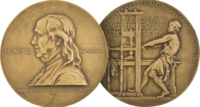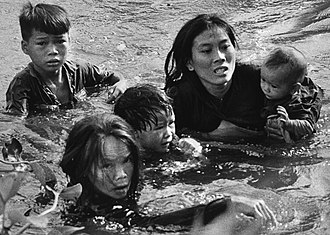Pulitzer Prize for Photography
Appearance
| Pulitzer Prize | |||||||||||
|---|---|---|---|---|---|---|---|---|---|---|---|
 | |||||||||||
| Journalism | |||||||||||
|
|||||||||||
| |||||||||||
|
|
|||||||||||
The Pulitzer Prize for Photography was one of the American Pulitzer Prizes annually awarded for journalism. It was inaugurated in 1942 and replaced by two photojournalism prizes in 1968: the Pulitzer Prize for Feature Photography and "Pulitzer Prize for Spot News Photography", which was later renamed Pulitzer Prize for Breaking News Photography in 2000.
The Pulitzer Prizes were established by the bequest of Joseph Pulitzer, which suggested four journalism awards, and were inaugurated beginning 1917. By 1942 there were eight Pulitzers for journalism; for several years now there have been 14 including the two for photojournalism.
Winners
[edit]There were 26 Photography prizes awarded in 26 years, including two in 1944 (for 1943 work) and none in 1946.[1]
| Year | Image | Photographer | News agency | Title / Description |
|---|---|---|---|---|
| 1942 | 
|
Milton Brooks | Detroit News | "Ford Strikers Riot" |
| 1943 | 
|
Frank Noel | Associated Press | "Water!" |
| 1944 | 
|
Earle L. Bunker | World-Herald (Omaha, Nebraska) |
"Homecoming" |

|
Frank Filan | Associated Press | "Tarawa Island" | |
| 1945 | 
|
Joe Rosenthal | Associated Press | "Raising the Flag on Iwo Jima" |
| 1946 | No award | |||
| 1947 | 
|
Arnold Hardy | Amateur photographer (Distributed by AP) |
A woman leaping from a fire in the Winecoff Hotel.[2] |
| 1948 | 
|
Frank Cushing | Boston Traveler | "Boy Gunman and Hostage", in which a 15-year-old boy held another boy hostage in an alley.[3][4] |
| 1949 | 
|
Nathaniel Fein | New York Herald-Tribune | "Babe Ruth Bows Out", of Babe Ruth at his number retirement by the Yankees. |
| 1950 | 
|
Bill Crouch | Oakland Tribune | "Near Collision at Air Show" |
| 1951 | 
|
Max Desfor | Associated Press | For his photographic coverage of the Korean War, an example of which is Flight of Refugees Across Wrecked Bridge in Korea.[5] |
| 1952 | 
|
John Robinson and Don Ultang | Des Moines Register | A sequence of pictures of a Drake University–Oklahoma A&M football game in which Drake player Johnny Bright's jaw was deliberately broken. |
| 1953 | 
|
William M. Gallagher | Flint Journal (Michigan) |
Ex-Governor Adlai Stevenson with a hole in his shoe, taken during the 1952 presidential campaign. |
| 1954 | 
|
Virginia Schau | Amateur photographer | "Rescue on Pit River Bridge", a photograph of a thrilling rescue at Redding, California. |
| 1955 | 
|
John L. Gaunt, Jr. | Los Angeles Times | "Tragedy by the Sea", shows a young couple standing together beside the Pacific Ocean in Hermosa Beach, California. Moments earlier their nineteen-month-old son disappeared.[4] |
| 1956 | 
|
Staff | New York Daily News | For consistently excellent news picture coverage in 1955, an outstanding example of which is "Bomber Crashes in Street", a photo of a B-26 bomber crash in a neighborhood.[4] |
| 1957 | 
|
Harry A. Trask | Boston Traveler | Photographic sequence of the sinking of the liner SS Andrea Doria, the pictures being taken from an airplane flying at a height of 75 feet nine minutes before the ship sank. (The second picture in the sequence is cited as the key photograph.) |
| 1958 | 
|
William C. Beall | The Washington Daily News (D.C.) | "Faith and Confidence", showing a policeman patiently reasoning with a two-year-old boy trying to cross a street during a parade.[6] |
| 1959 | 
|
William Seaman | Minneapolis Star | "Wheels of Death", his photograph of the sudden death of a child in the street. |
| 1960 | 
|
Andrew Lopez | United Press International | Series of four photographs of a corporal of dictator Fulgencio Batista's army, who was executed by a Fidel Castro firing squad, the principal picture showing the condemned man receiving last rites. |
| 1961 | 
|
Yasushi Nagao | Mainichi Shimbun (Tokyo) (Distributed by UPI) |
"Tokyo Stabbing", showing 17-year-old Otoya Yamaguchi stabbing Inejiro Asanuma, the chairman of the Japanese Socialist Party. |
| 1962 | 
|
Paul Vathis | Associated Press | "Serious Steps", showing John F. Kennedy and Dwight D. Eisenhower walking together at Camp David. |
| 1963 | 
|
Héctor Rondón | La República (Caracas, Venezuela) (Distributed by AP) |
"Aid from the Padre", picture of a priest holding a wounded soldier in the 1962 El Porteñazo insurrection in Venezuela. |
| 1964 | 
|
Robert H. Jackson | Dallas Times-Herald | Jack Ruby Shoots Lee Harvey Oswald shows the moment that Ruby shot Oswald |
| 1965 | 
|
Horst Faas | Associated Press | For his combat photography of the war in South Vietnam during 1964. |
| 1966 | 
|
Kyoichi Sawada | United Press International | For his combat photography of the Vietnam War during 1965. "Flee to Safety", depicting a Vietnamese family wading across a river to escape an attack, was cited as a noted example of his work.[7] |
| 1967 | 
|
Jack R. Thornell | Associated Press | Civil rights activist James Meredith lying wounded on a road in Mississippi after having been shot by a roadside gunman. |
See also
[edit]References
[edit]- ^ "Photography". The Pulitzer Prizes. Retrieved January 2, 2021.
- ^ Heys, Sam. "Pulitzer Photo - Georgia Tech student was the first photographer at the scene of Atlanta's worst hotel fire". Georgia Tech Alumni Association. Archived from the original on 2013-12-22. Retrieved 2012-04-18.
- ^ "boyhostage". The List Blog. Archived from the original on 2012-03-06. Retrieved 2010-05-18.
- ^ a b c Rubin, Cyma; Newton, Eric, eds. (2011). The Pulitzer Prize Photographs. Newseum Inc. ISBN 978-0-9799521-3-5.
- ^ Hartzenbusch, Lara (June 25, 2010). "US photographer Max Desfor relives Korean War". BBC News. Retrieved January 2, 2021.
- ^ "Archived copy". Archived from the original on 2011-06-26. Retrieved 2011-05-29.
{{cite web}}: CS1 maint: archived copy as title (link) - ^ "Boston newspaper wins Pulitzer Prize". Quad-City Times. Davenport, Iowa. AP. May 3, 1966 – via Newspapers.com.



